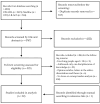Collaborative Practices in Mental Health Care: A Concept Analysis
- PMID: 40805925
- PMCID: PMC12346314
- DOI: 10.3390/healthcare13151891
Collaborative Practices in Mental Health Care: A Concept Analysis
Abstract
Background/Objectives: Collaboration in mental health care is essential for implementing a model oriented towards the psychosocial rehabilitation of people based on multifaceted interventions involving different actors and sectors of society to respond to demands. Despite the benefits presented by the scientific evidence, there are still many barriers to collaborative care, and professionals continue to struggle in reorienting their conduct. The current situation demands organization and the framing of well-founded action plans to overcome challenges, which in turn requires a detailed understanding of collaborative practices in mental health care and their conceptual boundaries. A concept analysis was undertaken to propose a working definition of collaborative practices in mental health care (CPMHC). Methods: This paper used the Walker and Avant concept analysis method. This includes identifying the defining concept attributes, antecedents, consequences, and empirical referents. A literature search was carried out from November 2024 to February 2025 in three databases (Medline, CINAHL, and LILACS), considering studies published between 2010 and 2024. Results: The final sample of literature investigated consisted of 30 studies. The key attributes were effective communication, building bonds, co-responsibility for care, hierarchical flexibility, articulation between services, providers and community, monitoring and evaluating of care processes, and attention to the plurality of sociocultural contexts. Conclusions: This comprehensive analysis contributes to guiding future research and policy development of collaborative practices in mental health, considering the individual, relational, institutional, and social levels. Further research is possible to deepen the understanding of the production of collaborative practices in mental health in the face of the complexity of social relations and structural inequities.
Keywords: collaboration; concept analysis; interprofessional relations; mental health; mental health service; person centered care.
Conflict of interest statement
The authors declare no conflicts of interest. The funders had no role in the design of the study; in the collection, analyses, or interpretation of data; in the writing of the manuscript; or in the decision to publish the results.
Figures
Similar articles
-
Prescription of Controlled Substances: Benefits and Risks.2025 Jul 6. In: StatPearls [Internet]. Treasure Island (FL): StatPearls Publishing; 2025 Jan–. 2025 Jul 6. In: StatPearls [Internet]. Treasure Island (FL): StatPearls Publishing; 2025 Jan–. PMID: 30726003 Free Books & Documents.
-
Home treatment for mental health problems: a systematic review.Health Technol Assess. 2001;5(15):1-139. doi: 10.3310/hta5150. Health Technol Assess. 2001. PMID: 11532236
-
The experiences of midwives and nurses collaborating to provide birthing care: a systematic review.JBI Database System Rev Implement Rep. 2015 Nov;13(11):74-127. doi: 10.11124/jbisrir-2015-2444. JBI Database System Rev Implement Rep. 2015. PMID: 26657466
-
Patient Restraint and Seclusion.2025 Aug 6. In: StatPearls [Internet]. Treasure Island (FL): StatPearls Publishing; 2025 Jan–. 2025 Aug 6. In: StatPearls [Internet]. Treasure Island (FL): StatPearls Publishing; 2025 Jan–. PMID: 33351431 Free Books & Documents.
-
Factors that influence participation in physical activity for people with bipolar disorder: a synthesis of qualitative evidence.Cochrane Database Syst Rev. 2024 Jun 4;6(6):CD013557. doi: 10.1002/14651858.CD013557.pub2. Cochrane Database Syst Rev. 2024. PMID: 38837220 Free PMC article. Review.
References
-
- Ipsos . Ipsos World Mental Health Day Report 2024. Ipsos; Paris, France: 2024. [(accessed on 8 April 2025)]. Available online: https://www.ipsos.com/en-id/ipsos-world-mental-health-day-report-2024.
-
- World Health Organization (WHO) World Mental Health Report. WHO; Geneva, Switzerland: 2022. [(accessed on 28 March 2025)]. Available online: https://www.who.int/teams/mental-health-and-substance-use/world-mental-h....
-
- GBD 2019 Mental Disorders Collaborators Global, regional, and national burden of 12 mental disorders in 204 countries and territories, 1990–2019: A systematic analysis for the Global Burden of Disease Study 2019. Lancet Psychiatry. 2022;9:137–150. doi: 10.1016/S2215-0366(21)00395-3. - DOI - PMC - PubMed
Grants and funding
- Finance Code 001, Process Number 23038.007616/2023-84/Coordenação de Aperfeicoamento de Pessoal de Nível Superior
- This work was also supported by FCT-Fundação para a Ciência e a Tecnologia, I.P. (UID/05704/2023), and by the Scientific Employment Stimulus-Institutional Call-[https://doi.org/10.54499/CEECINST/00051/2018/CP1566/CT0012, accessed on 25 June 2025]/Fundação para a Ciência e Tecnologia
LinkOut - more resources
Full Text Sources



